My first real job, hauling hay for a farmer I hardly knew, started on a bad note. This was in the late spring of 1964, before the days of the giant round hay bales, back when desperate farmers sought crews of eager teenage boys to come move hundreds of square bales of hay from their fields to their barns in a single day. Not every young boy, however, made it through his first day. Hauling hay was a long, hot, dusty, backbreaking process, featuring a crew of soon worn out boys mindlessly loading and unloading wagon after wagon of dusty, itchy hay, sort of like Sisyphus endlessly pushing the same boulder up a mountain, only to have it roll back down again.
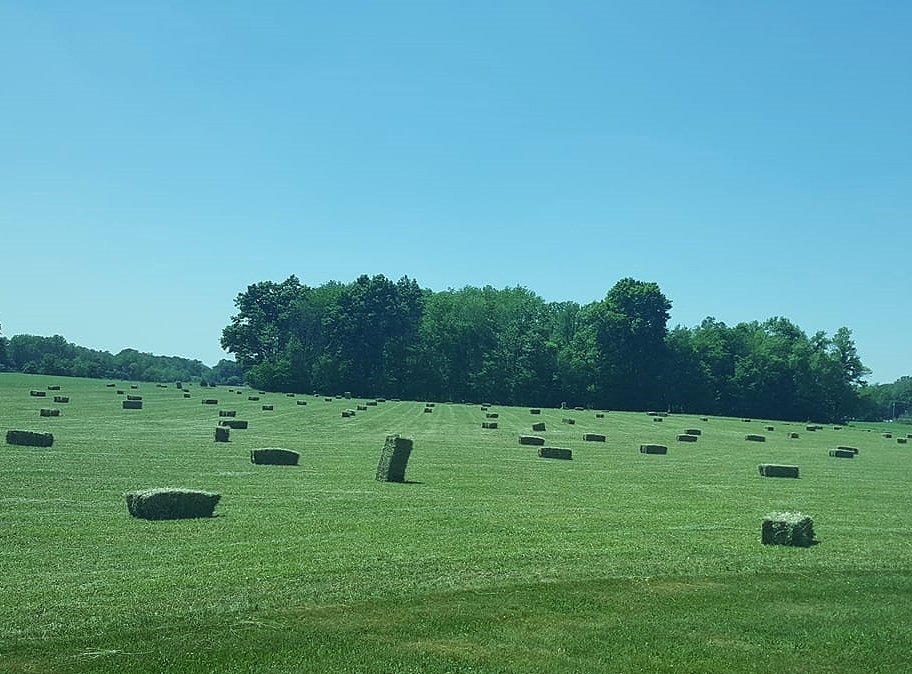
I was thirteen when I got my first call to work in a hay field. Big for my age, I had yet to do any real “man’s work.” It did not help my situation either that in my naivety I had forgotten to bring any gloves.The farmer, who had called me to work for him that day, after he rolled his eyes, limped over to his squat tractor and found a greasy pair of gloves in a toolbox. He made a big deal out of digging them out—ransacking through tools as he grumbled and cursed under his breath—then pitched the gloves, underhand, my way.
I missed the catch.
The gloves were an orangey yellow color darkened by grease, a little ragged but still thick and heavy, with reinforced sections of extra gray-colored cloth sewed on the palms and at the front of the fingers, sturdy as a pair of medieval gauntlets. I tried pulling them on, an awkward process, then thought better of it.
I stuck the gloves into one of my back jeans pockets and stood around, hands in front pockets, not daring to move more than a step or two while the farmer gassed up the tractor and hooked a beat-up hay wagon to the tractor’s drawbar. The sun, and, I supposed, a wife dutiful to a fault about clothes washing had bleached most of the blue from the farmer’s denim shirt, and the top two buttons were missing, revealing pale fish-white skin that contrasted in a disturbing way with his heavily tanned arms and face.
Always something of a control freak, I desperately wanted to ask the farmer about what exactly I’d be doing that day, but his gruff demeanor warned me off. There would be no training for a novice, just sink or swim.
After the farmer finished with hooking the tractor to the hay wagon, he and I stood in the growing heat, the farmer pushing his worn cap forward to the front of his head and absently scratching the back of his neck in contemplation. I began sweating from nervousness, both of us waiting in awkward silence for the rest of the hay-hauling crew to show up. The only break from the uneasy situation occurred when his wife, a surprisingly small and attractive woman, stepped out lively from the front farmhouse door carrying a dishpan. She marched out into the yard, turned to us and smiled and, in a twist and heave, flung dirty water in a graceful arc across a patch of ragged grass.
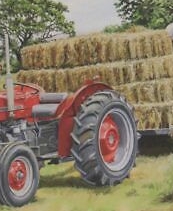
A black Ford Falcon, misfiring on one of its cylinders, crept up to the barn where the farmer and I had been standing for a good thirty minutes. Three teenagers, two with burr haircuts and one with dark curly hair, piled out of the car—sophomores from a nearby town, as it turned out—all older than me. They were city boy jocks whose coach apparently thought working in the hay fields would be good conditioning for football. This would have been back in the mid-1960s, before steroids and before coaches had bought into the idea of hard-core year-round weight training for their players.
I was just glad they had not arrived first to see my mother dropping me off.
One of the jocks came up only a little higher than my shoulders but possessed a thick neck and vein-y biceps the size of small melons, a miniature Tarzan. The other two boys sported ropy arm muscles, shown off to great advantage in shirts with the sleeves cut off. All three moved with the grace and confidence of athletes.
It was like being put into a pen of three dogs who had already worked out the male hierarchy. While the three newcomers and I waited on the farmer who had stepped inside his farmhouse, Tarzan explained to me in a voice that sounded like an old time movie gangster that the tallest of the trio was the football team’s second-string quarterback, “and a damn good one too. I wouldn’t be messing around with him if I were you.” The quarterback grinned and nodded.
The other tall boy, the one with the dark curly hair, wore a rakish-looking red bandana around his neck, not your standard issue for the hay field. He stood there seemingly lost in thought, paying no attention to the territorial pissing taking place. The other two city boys called him Gypsy.
If I could, I would have walked away.
The crippled farmer came out of his house lugging a five-gallon galvanized zinc water cooler that he heaved onto the hay wagon, an item that would come to take up most of my attention and thoughts before the day was over. The farmer’s limp became a rolling gait when he hurried over to get his tractor started. He gunned the engine and said, “Let’s get going. I’m not paying you guys to stand around.”
The jocks did not so much as nod my way as they climbed aboard the hay wagon while I stood with my feet frozen to the ground. Tarzan and the quarterback started kidding the one they called Gypsy about his date from the night before.
“You should’ve put a sack over her face,” said Tarzan.
The quarterback laughed.
Gypsy gave it right back to them. “I don’t care what you guys say. I like her.”
The tractor’s engine gunned again, the farmer trying to get me to move, acting mad now but fighting a growing grin, obviously enjoying the verbal show the jocks were putting on. The quarterback, aware of the farmer’s attention, slowly pulled out a pair of sunglasses from his shirt pocket—taking his time putting them on while the farmer and the rest of us watched. Then the quarterback turned his head my way.
Before my mother drove me to work that morning, she had helped me rummage through the back of my dad’s closet to find a worn-out dress shirt for me to wear so my arms would not get scratched too badly. It was this odd garb that caught the quarterback’s unwanted attention.
The quarterback, his eyes hidden behind the sunglasses, crossed his arms and looked down from the wagon to where I stood on the ground.
“Where’d you get that shirt?”
My fate turned on the farmer losing patience with the adolescent drama. He suddenly let his foot off the tractor clutch, the tractor and wagon moving forward amidst laughter from the crew. I sucked in a breath and scrambled to climb aboard the wagon, dreading the day ahead.
At least Gypsy reached down his hand and helped pull me aboard, giving me a playful wink.
****************
Several hundred greenish-brown bales of hay were sprawled over the large field. Most of the bales lay flat, but a few stood upended, like organic gravestones. Little waves of heat danced just off the ground at the other end of the field, distorting the shape of a distant line of trees and turning the hazy tree line blue. What little breeze had been kicking up before our arrival at the field suddenly died.
There was one gift. The sweet aroma of freshly cut hay, an odor that would hereafter make my heart catch each time I smelled it, came into my nostrils for the first time.
The farmer stopped the tractor, climbed off, and hauled the water can to the shade of the nearest tree, a spot that was to become an oasis of too-quick excursions of rest and drastically needed hydration. Legs trembling, I hopped off the hay wagon with the rest of the crew, my ignorance of what to do next about to be revealed. I pulled on the ragged gloves the farmer had given me, dropping the left glove twice in the process, buying what time I could.
The other three had jumped off the wagon like soldiers leaping from a helicopter, Tarzan doing a handspring over a bale of hay. They marched into the field and moved among the bales while I stood planted where I had first hopped off the wagon. Then the quarterback walked back to where the farmer stood.
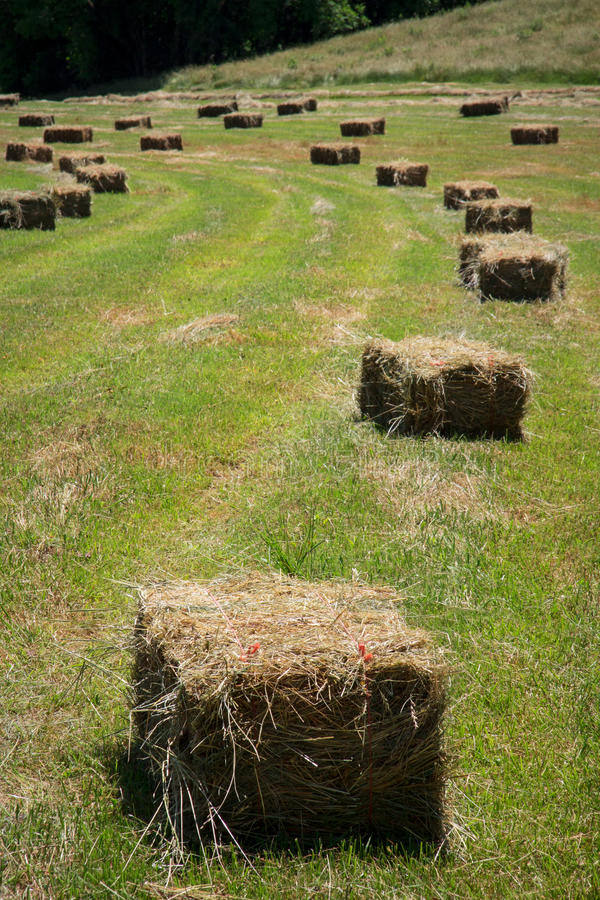
“Gypsy’s pretty good at stacking bales on the wagon,” the quarterback said, pointing at the taller of the other two jocks.
The farmer responded by motioning me to get back onto the wagon. “You’re going to stack,” he told me.
Turning to the three jocks, adjusting his cap on his head, the farmer hollered out like a salty, no-nonsense drill sergeant. “Bring me some bales, gentlemen.”
The farmer joined me on the wagon, a place that had suddenly turned into a hostile stage. Whistling under his breath, he pushed and lifted several bales around on the wagon’s deck to get each placed just right, correctly laying the first back two rows of bales. I watched, hands in my pockets, trying to ignore the mugging faces Tarzan was giving me behind the farmer’s back.
As the farmer labored, a dark wetness began to expand on the back of his faded denim shirt, turning into a map in the unlikely shape of Texas. He stopped once to make sure I was paying attention. “See, you’ve got to tie each layer in.”
I acknowledged his statement with a big vacant nod, too ashamed to admit I was unsure about most of what he was showing me. The three jocks, busy carrying the bales over and lifting them onto the wagon for the stacking demonstration, shot the kind of hateful glares at me I supposed they reserved for opposing football players.
The farmer stopped and pointed his chin at his efforts. His faded blue work shirt was now completely drenched in sweat. “That’s all there is to it. Any questions?”
I nodded my head in false affirmation.
As he climbed off the wagon, he said in a cheerful voice, the first kind tone I had heard from him that day, “You’ll get the hang of it.”
At first it was like being on a small boat at sea. The yawing movement of the wagon as it plodded over the uneven field, the intense relentless heat, would have been difficult enough to deal with had I not been leaning over to grab the bales of hay coming at me from three different directions. Then I had to carry and precisely stack each bale, starting at the back of the wagon, so they would ride.
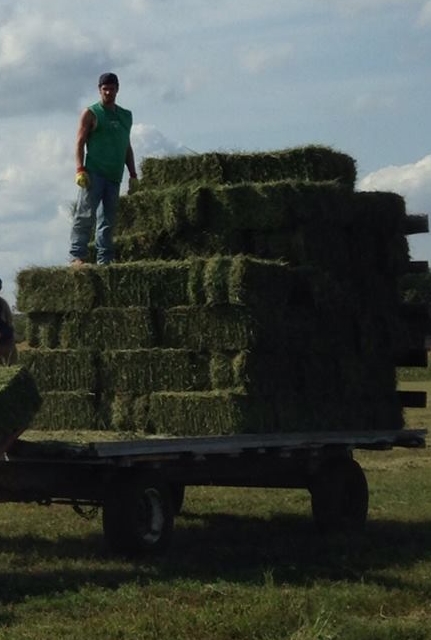
Each layer took me higher and increased the pitch of the moving wagon. Twice the farmer stopped the tractor, hobbled back, and hoisted himself up on the wagon, climbing up to demonstrate how to place a key bale.
“You get these bales tied in, and with all this weight pressing down, they’ll ride even if the wagon goes off a cliff.” One side of his mouth turned up in a slight grin. “Maybe not off a cliff.”
The rest of the hay crew had made faces at me both times the farmer had stopped to assist me. Once, the quarterback, his eyes still hidden behind his sunglasses, whispered “baby” as he slung a bale extra hard up to me.
The bale struck me in the side of the face and knocked me back. I lurched up and pretended not to hear him, the place where the hay bale scratched into my skin stinging fiercely. I just concentrated on doing what the farmer had shown me—crisscrossing the bales on each succeeding layer and bringing in each new level half a width of a bale so that the load tapered in as it went up.
Before the first load was stacked, the quarterback began calling me “kid.” The name stuck for the rest of the day.
****************
Stacking bales of hay on a wagon was like stacking coins. A few misplaced bales in the lower part of the stacking could make the load lean too much at the top. This was the hard lesson I learned when the back part of the first load I stacked cascaded down into a ditch just as we were leaving the hay field on the way to the barn.
In one voice, all of us shouted “stop!”
The tractor halted with a jolt just as the quarterback and I leaped off the wagon.
At least two dozen twisted bales, some broken apart, lay piled and scattered in the dust. The quarterback pushed his sunglasses to the top of his head, crossed his arms, and laughed, slapping me hard on the back. “Well, those bales are sure ruined, kid,” he said to me. He gave a thumbs-up to Gypsy.
I tried to swallow, but my mouth was too dry. The side of my face burned with sweat where the bale the quarterback had flung at me earlier had grazed.
The farmer came up to the scene looking neither left nor right. He ordered Gypsy and Tarzan to push at the ends of each busted bale until they took back some of their original shape. The two youths grunted with the effort. No air stirred, and sweat rolled down their faces, leaving tracks through the grime.
While the two jocks strained, the farmer somehow re-tied the broken twine of each bale tight enough that the broken bales looked almost as firmly compressed as the others. The process took maybe thirty minutes—time the farmer would surely begrudge losing.
Finished, the farmer stood, groaning and stretching, an arthritic knee protesting with a crackling pop. The last few bales were beyond fixing and were pushed aside. He turned and looked at the patched-up bales and then at me. “We’ll get those when we come back. Next time, stack the back of the wagon like you stacked the front.”
The jocks looked disappointed, especially Gypsy, who had thought he’d get the hay-stacking job.
The farmer climbed, with some effort now, back onto the little Ford tractor and the crew scrambled back on the load of hay. I sat toward the rear, next to the section of missing bales. The other three rode in the front, ignoring me and continuing their earlier discussion about the merits of Gypsy’s girlfriend.
****************
There was only one long break in hauling hay from field to barn. In mid-afternoon, the farmer’s wife, holding a large egg basket by its handle with one hand and an old galvanized well bucket in the other, arrived with ham-and-cheese sandwiches lathered in mustard and cold bottles of Coca-Cola nestled down in chipped ice. We pressed and rolled the cold wet bottles against our sunburned faces before we gulped them down. The fat sandwiches disappeared just as fast.
The farmer received a thermos of coffee from his petite wife. He sat down Indian-style, taking long sips while she lightly placed a hand on his shoulder. My mother had told me that morning that they were a childless couple, a fact that meant nothing to me until she added that the farmer had been wounded in the Korean War and had been decorated for valor.
I stole a few quick glances at the wife as she quietly returned to handing us food and drink.
By late afternoon the sun’s angle was less direct and harsh, but it was all I could do to wobble. My sun-scorched face pulsed with heat. I tried fantasizing about gulping down entire gallons of cold water in one long, luxurious swallow. Then I changed fantasizing directions altogether and thought about an interesting girl I had talked to a lot the previous summer at church camp. That fantasy helped sustain me through the rest of the afternoon.
As the day wore on, the farmer slowed the pace somewhat and gave us longer and more frequent water breaks. But even that and eating what was left of the sandwiches the farmer’s wife had brought earlier failed to restore us to the level of energy we had possessed when we started.
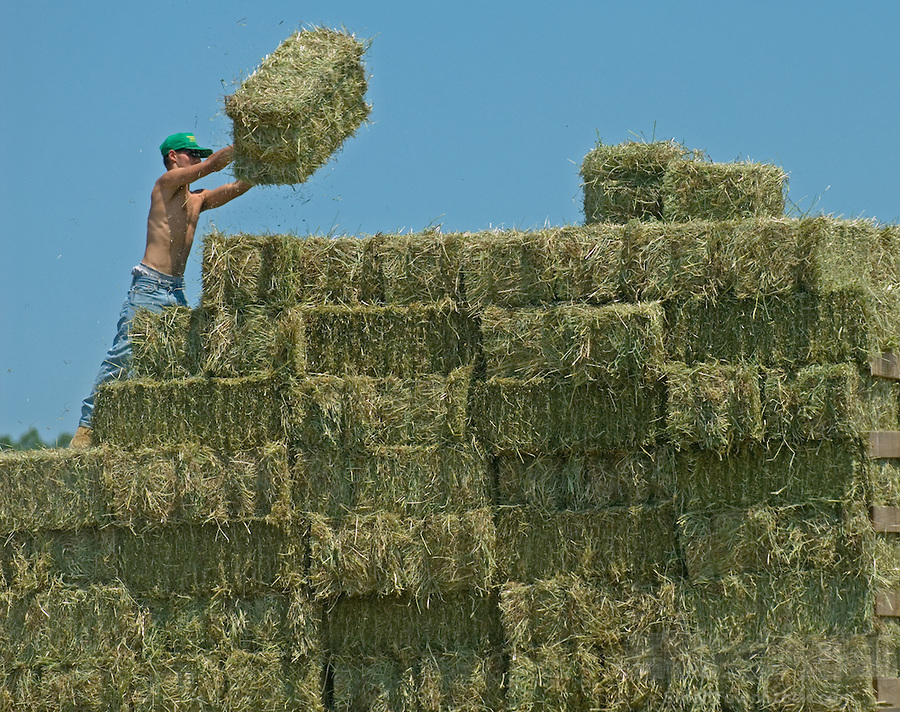
Every time we stood up from water breaks, we were like punch-drunk boxers, staggering to stay in the ring. All the teasing and grab-assing among the three jocks died away, and there was no more talk about the upcoming football season or Gypsy’s girl.The three jocks became as silent and passive as stumbling zombies, Gypsy now wearing his red bandanna tied around his head as a sweat band.
The heat persisted—grew and wrapped its weight around us. Even the light breezes forsook us. I grew more and more thankful for my assignment on the wagon, finding a rhythm of stacking that allowed me to more or less keep up with the relentless bales coming my way.

The rest of the loads that I stacked rode to the barn. As for the city boys boys, Tarzan, despite arm muscles that bulged and popped, was so short that he eventually had difficulty lifting the bales up to the wagon. His grunting efforts grew louder and more pathetic as the day wore on.
The other two jocks would also have their troubles.
Gypsy had also forgotten to bring gloves and unfortunately for him, I had gotten the only extra pair the farmer had, the luck of the draw. The bailing twine soon rubbed savage blisters into both of his tender palms. For all intents, Gypsy’s blisters that day brought the hay crew down to three of us, not counting the farmer, who, because of his limp, just drove the tractor.
I went over to Gypsy during one of our water breaks, feeling a bit guilty since I had been given a pair of gloves earlier. He was sitting beneath a tree at the edge of the hay field, wiping the sweat from his face with his now soiled bandana, like a wounded soldier. As I walked toward him, he held up his palms to show me the bloody mess. He gave me a twisted and bemused smile, as if to say, “Can you believe this?” I really didn’t know what to say. I ran my fingers through my sweaty hair and told him I thought his girl sounded like an interesting person.
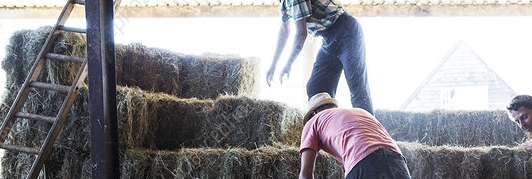
As for the quarterback, he may have been good on the football field, but he just couldn’t seem to get the hang of carrying or pitching a bale of hay. As he carried the bales to the wagon, he lifted the bale higher than he needed to, a wasted effort. He should have kept his arms straight down after he’d picked up a bale and rested the load against a leg while waiting for the wagon to come to him. A few times, when he tried to pitch a bale up on the rising levels of hay, the bale came back on him, wrestling him down, as if the bale was alive and angry.
His defects would not have been as noticeable if there had not been so many bales to move that day. The quarterback just wore himself out.
These matter-of-fact observations about the city boys’ failures, mostly of it regarding the advantage of leverage, were passed on to me by the farmer as I helped him unload each wagon. As the farmer explained these things, and I listened, the muffled complaints and groans of the jocks, struggling to stack the bales in the loft of the farmer’s hot, airless barn, floated our way.
The farmer’s advice did not fall on deaf ears. During the rest of that summer, I asked questions of other farmers, paid close attention to the dynamics of hauling hay, grew good at it, and in succeeding summers participated in every part of the hay hauling process: mowing, raking, loading, and unloading thousands of bales of hay. I also discovered that hay hauling wasn’t all brutal labor. One time our hay crew got rained out and stuck in a barn, dodging an unexpected storm. We huddled together, half drenched and shaking inside the shadowy space of the dry building, the rain beating down on the tin roof with the fury of a tropical storm. The farmer we were working for came and sat beside us during the downpour, telling us war stories that grew grimmer as he spoke. Before he finished his last tale, he fell silent, his mind seemingly drifting to something else. Then, in a voice so timid we had to lean forward to hear what he was saying, he revealed a long-forgotten ambition while lightning and thunder crashed outside the shelter of the barn.
“Just before I left Korea, I promised myself I’d go to college on the GI Bill, make something of myself—a teacher maybe.” He looked up at us before he spoke, a crooked little smile forming. “Go to school!”
On another occasion, an old-timer, his skin so pale and white it looked as if it had been bleached, taught me to tie a baler’s knot, weaving and twisting two broken ends of bailing twine together so they were as strong as before, an odd and totally useless skill that today I’m strangely proud to possess.
***********************
My legs were cramping and my fingers were swollen when the tractor and wagon carried us up to the barn with the last load of hay. Although dusk had fallen, the still air remained as hot as if it were coming from a blast furnace. In the eastern sky, just above the horizon, the sliver of a new moon, as precise and smooth as a piece of glass, appeared like an archetypal harbinger.
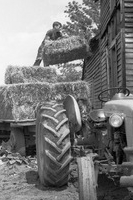
The farmer shut off the tractor, hobbled over, and entered the darkened barn. A couple of lights winked on inside. The weary jocks and I climbed off the wagon and headed for the water can. Gypsy slid down next to a wall and closed his eyes, looking more dead than resting.
The other two city boys sat brooding over the water can like tired old men.
I sat apart from them, lifting my throbbing sunburned face up to a sudden breath of wind. The quarterback, in a weak, hoarse voice, told Tarzan that he would never haul hay again and began listing all the horrible things about the task: too dangerous, too low paying, too unworthy of any thinking person, fit only for a country boy or an idiot. Tarzan made a couple of low grunting noises in what I took to be complete agreement.
The quarterback was still deep into his lament when the farmer came out of the barn to sally us one last time, an odd look of cheerfulness on his face. He stopped and listened to the quarterback, then looked over at me, shaking his head. I offered back a feeble smile. To my surprise, he limped over to where I sat, bent close, and said, “You did a good job today, son. Keep the gloves.”
I used those worn greasy gloves the farmer gave me for many succeeding summers in the hay fields, until they grew so torn and ragged that my mother, in one of her cleaning fits, threw them away.